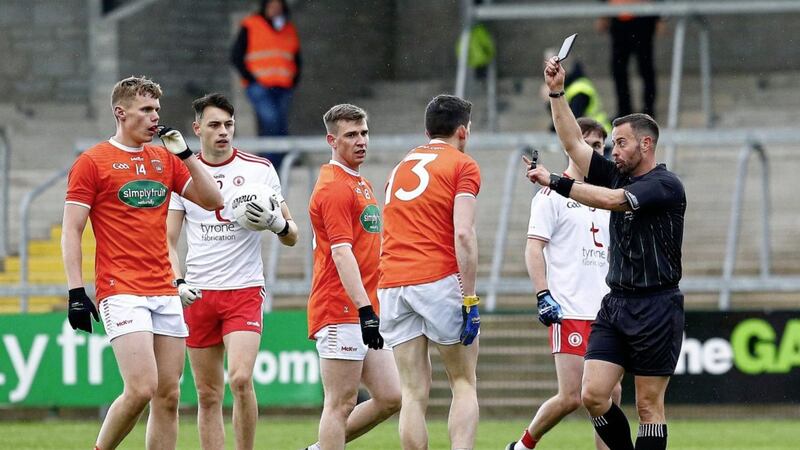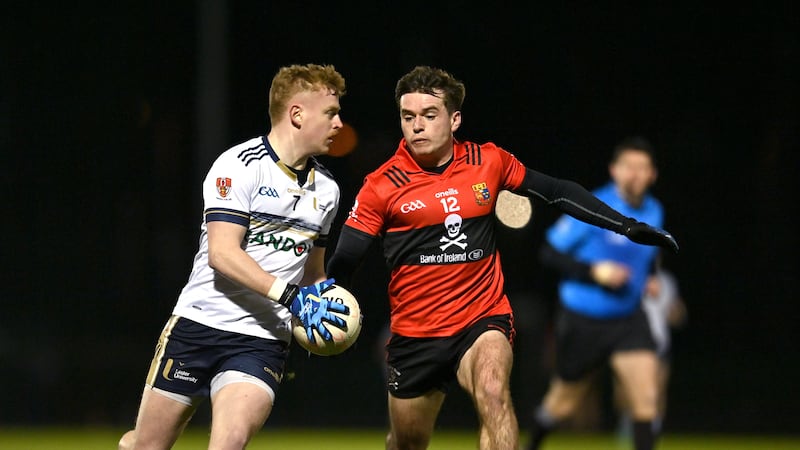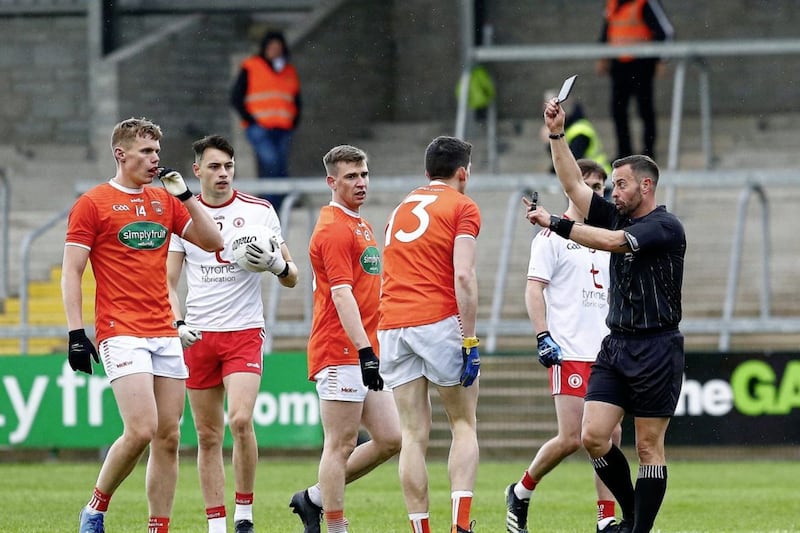THE second half of last Saturday’s Division Three North encounter at Brewster Park was played at frenetic pace in warm sunshine. All tolled there were 79 minutes of action and the players were tired at the finish.
But spare a thought for Liam Devenney, the referee, who must have crawled into his bed when he got back to Mayo on Saturday night.
The Ballina whistler had a good game in the draw at Brewster. Somehow he managed to keep a handle on events while judging all manner of fouls (16 scores came from frees), whether shots had sneaked inside the post, time-wasting (Fermanagh were penalised twice for taking too long over kick-outs), offensive marks, midfield marks and defensive marks, doling out cards for the various categories of offences (yellow, black and red were all shown), deciding whether goal-scoring opportunities were prevented, enforcing the new advantage rule etc, etc, etc.
We used to judge a referee’s performance on whether or not he or she was noticed on the field but that is virtually impossible in Gaelic Football now because there are rules, and sub-sections of those rules, to be enforced for every occasion.
The powers that be continuously add to the rule book (they never seem to take rules away) and obviously that means there are going to be more laws and, as a consequence, more mistakes and, as a consequence, more confusion and argument.
Instead of simplifying the laws of the game for the referees, they have become more intricate, nuanced and complicated and so it gets harder to officiate, harder for players to operate within the rules and harder for supporters to follow what’s going on.
At every level there is a different understanding of the rules and, in fact, there are different rules at play for the county game and the club game.
For example, the new rule on preventing a goal-scoring opportunity being punishable with a black card and the award of a penalty to the attacking team is being trialled in the National League.
Referee Devenney had that to make a call on such an incident on Saturday and, after consulting with his umpires, he decided to show Fermanagh goalkeeper Chris Snow a black card but didn’t award a penalty.
How could you implement that rule at club level? You can imagine how the conversation would unfold if a referee (who’d arrived at the ground alone) went to consult with the men from either club who had reluctantly agreed to umpire at the game.
“Aye, that’s a black card and a penalty ref, sure he near killed him,” says one, getting in the ref’s ear first.
“Don’t listen to him ref, he dived, our boy never touched him,” says the other with vocal backing from defenders, goalkeepers and their mothers, fathers, wives, uncles, cousins and extended family and friends.
Bedlam and there’s enough of that already.
I’m not arguing that Gaelic Games are perfect but what was once a simple game is in danger of becoming over-complicated by this constant tinkering with the rules. Changes are being made too fast for players and spectators to keep up.
I saw for myself recently that some players still haven’t realised that you can’t have an attacking mark from a free-kick, so how long will the more complicated new laws take to bed in? And just while we’re on the subject, why not have an attacking mark from a free?
That is another rule that the put-upon referee has to enforce which causes disagreement because some managers, players and many spectators do not fully understand it. Is that their fault or the fault of the law-makers?
A couple of years ago a rule came in which stipulated that if a free was taken from the wrong place, a hop-ball was awarded AND if a free didn’t travel 13 metres then the free went the other way.
Confusion.
Here’s more confusion: If a kick-out didn’t travel 13 metres the defender in possession couldn’t pass it back to the goalkeeper. But what happens if the full-back takes the kick-out? Can a defender pass it back to him?
How accurately can you judge 13 metres on a grass field? GAA boffins seem to assume that referees are equipped with an innate ability to measure distances. Of course, referees were already expected to accurately measure time in the heat of the action for the ‘five-second’ advantage rule.
In all fairness the advantage rule worked well but it has now been changed and these days an official can only play advantage if there is “the potential of goal-scoring opportunity” or “by creating or capitalising on time and space”.
More interpretation, grey areas and confusion there.
You wonder if there is a clear vision in Croke Park of exactly what sort of game they want to create? Since 2014, when the black card was brought in, rule after rule and sub-section after sub-section has been introduced and the constant tinkering has become almost par for the course.
Seven substitutes are now allowed in the game but to prevent dastardly managers from wasting time by bringing them on, they must all be made during five windows. This led to the ridiculous situation where Armagh’s Jemar Hall was subbed after he’d just scored a superb point against Tyrone because his manager, who’d had to deal with a succession of injuries, needed to make a double switch (in his fourth window) to get some fresh legs on.
In another recent club game, the referee issued three black cards and they were all, as far as I could establish, correct decisions. But is that sort of mean-spirited, over-officious and complicated law-making adding anything to the game? It is not. Yellow cards would have sufficed.
You couldn’t help but feel sympathy for the poor oul ref as he scribbled a note of the time of the black card in his book in the pouring rain so he could signal when the sin-binned player could come back on the field.
And in the midst of all of this confusion, opinion differs over what constitutes a fair tackle.
As far as I understand it, a fair tackle is touching the ball without making any physical contact with the player. Is that even possible above U11 level?
Yes, the tackle is clearly defined in the rulebook but, in practical terms, it’s up to the referee’s discretion to decide what is, and is not, a fair tackle.
Most referees will allow play to continue if they feel a tackler has made a fair attempt to win the ball even though they have crossed the invisible line. After all, as we like to say, it is a physical game.
And the refereeing can change slightly depending on the state of the game. In a recent county match the ref came down hard on fouls in the first half but as the game developed towards a tense finale, he stopped blowing his whistle.
Yes, nobody wants to see a game decided by a ‘soft’ free. But, then again, surely what is a free in the first minute should be one in the last?
The next official might see fouls completely differently but sure the rules might have been changed by then anyway.
Is it any wonder they’re struggling to get referees?




